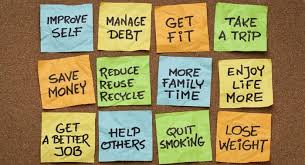Changing the New Year’s Question
As the new year rolls around, I’ve been thinking about how I facilitate future-action in the workshops I run, and how this can be translated into the New Year’s resolutions that we are all now contemplating at the dawn of the close of another year and start of the next.
As a Transformational Facilitator, I always make sure everyone leaves my workshops with a clear plan in hand. These are usually a series of small actions that they commit to take in the next day, week, or month that they have slowly accumulated over the course of the workshop, and that they commit to in word and writing before they leave. Because I promote and ascribe to the Spark Method, these action items are small, easy to achieve, and tied to their personal goals, and people generally feel optimistic and confident that they can follow through after they’ve been catapulted out of the relative calm of the workshop space and back into their hectic “real” lives.
In many ways, this is not dissimilar to typical New Year’s resolutions. We close out our year thinking about a laundry list of things we’d like to accomplish in the coming twelve months, invigorated by the prospect of starting over again and sticking to our plans. Our lists may contain concrete achievements, like running a 5K, volunteering at a shelter once a month, calling a good friend every weekend. Or they may be more focused on habit shifts or personal improvement, such as attempting to focus on the positive, listing gratitudes, or yelling less at our kids (ahem). We often even build up action steps around our plans, to help us stay on track (there are more and more apps for this!), or join forces with a friend or relative to form accountability partnerships. Many or our items eventually fade away (er, that 5K), bowled over by circumstance and life, but many actually come to fruition and help us feel motivated to start a new list as the next year rolls around.
As I started thinking about New Year’s resolutions and their relationship to my work in Transformational Facilitation, however, I realized that there is another way. What if instead of focusing on concrete lists of what we plan to achieve by the end of the year or upon leaving the workshop, we open our year and our workshops with a question, not about what we will do or accomplish – but what we will be left with when we are done. The question shifts from being centered on, “What will you do this year/after you leave this workshop?” to focusing on, “What do you hope to get out of this year/session?”
My New Year’s resolution list shifts dramatically with this small change in the question, most importantly because it assumes a level of personal knowledge about what is currently missing. For example, instead of trying to call my friends every Sunday, what I’m really hoping to get out of the year is more and deeper connections with friends. I’m not as interested in yelling less at my kids as I am in creating more peace and tranquility at home. And that 5K, what I’m really hoping for is to achieve some measurable level of physical activity. This change in question takes away the surface and gets below the surface, to the heart of what I really want out of year, or workshop.
So here is today’s action item for you: As you create your lists of New Year’s hopes and goals, try asking yourself, “What do I hope to get out of this year?” and see how it shifts your list. Likewise, as you step into your first days of facilitation in the new year, try asking your participants not only what they plan to do when they leave your space, but open your session with a question on what they hope to walk away with from your time together. Note these responses down, use them as a roadmap as you are generate action steps, and encourage everyone to hold onto this underlying motivation as they leave your presence and enter back into their world.
I’d love to hear your hopes for the new year! Feel free to post your responses in the comments. And, of course… Happy New Year!
